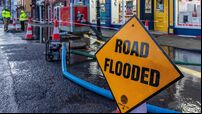Asphalt pollution danger highlights need for change in public transport approach

A Cork expert has highlighted the air pollution dangers of road asphalt and the need for change in transport.
Professor John Sodeau, emeritus professor of Chemistry at University College Cork (UCC) with research interests in Atmospheric Chemistry and Aerobiology, was speaking after new research revealed that emissions from asphalt are a significant source of air pollutants in cities, especially in hot weather.
Researchers from Yale University, Carnegie Mellon University and the Max Planck Institute for Chemistry found that asphalt emits secondary organic aerosols (SOA), which can have harmful health impacts, 300% more when heated.
Speaking to The Echo about this research, Professor Sodeau explained that although this is now an issue for warmer climates, climate change and increasing temperatures could see it become an issue in Cork in the future.
“Only six months ago the effect of diesel cars and trucks from their exhaust systems on our health began to be understood by the public and governments, and was pushing our road transport agenda toward the use of electric vehicles,” he explained.
“Small particles and nitrogen oxides from the combustion process were the chemicals we needed to eliminate.
“Many of these came directly from the combustion process, which meant it was easy to explain why electric vehicles should be used as our prime form of road transport,” he added.
“However, new studies show that this way of polluting our air is not the only one we have to contend with.
“Another one is the roads themselves, or at least the asphalt used in their construction.
“Heating up asphalt or shining light on it releases small toxic particles too.
“The temperatures required are more effective on California roads or in Turkey but climate change in a few years' time might make it much more of a Northern European problem.” Professor Sodeau queried that, if both roads and cars are part of the problem, what strategy should we adopt?
“Six months ago, the answer might have been for us to use a combination of Luas and EV buses alongside sustainable transport,” he said.
“But then came Covid-19, which has pushed us away from shared forms of transport for fear of infection.
“All these issues might be solved in a small city like Cork if the main artery communal transport system was not only run on electricity, batteries, etcetera, but if the buses and carriages were heated, ventilated, and air conditioned (HVAC),” he added.
“That means there is effective cooling, dehumidification, and filtration of the air within the enger compartment of each vehicle.
“Many buses are currently on the market with this technology, and if used we need never talk about nitrogen oxides, particles and fear of public transport again.”










 App?
App?


